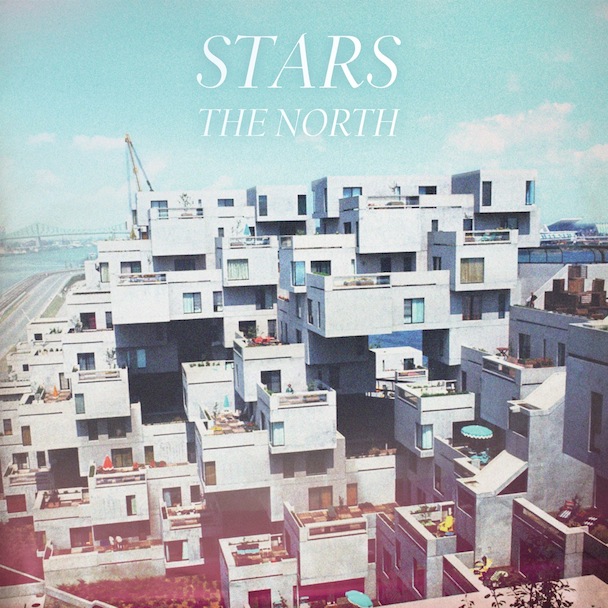“Well, the only way I see this happening is in an extended ride north…”
The line above is the first thing you hear on Stars’ new album The North, and it is a quote from the 1967 documentary “The Idea of North” by Glenn Gould. The film was commissioned by the Canadian government to commemorate the country’s centennial and dealt with Gould’s observations of isolation and solitude. Seeing as how Stars have dealt, in one way or another, with these same ideas over the course of their musical career, it makes perfect sense for this to be the first thing we hear, as opening track “The Theory of Relativity” kicks off its own variation of the bouncy synth-pop that the band has played around with for years. But it doesn’t take long before we realize that this album is going to veer off course rather quickly. The North is still replete with the kind of instantly hummable melodies and meticulous pop construction that was so evident on 2006’s Set Yourself On Fire and 2003’s Heart, but we are definitely getting there in a more round-about way. The wash of day-glo beats and thick, sticky synths combined with the bands considerable indie rock tendencies find the band in a more musically playful, if still sometimes lyrically morose, frame of mind.
After the synth-pop jolt of the opening track and lead single “The Theory of Relativity” the album settles in to a more familiar form, and follow-up song “Backlines” becomes a rollicking indie pop vehicle for the swelling vocals of Stars second-in-command Amy Millan. If you close your eyes, you could almost imagine that you were listening to some song off Last Splash by The Breeders. The guitars seem determined to race Millan’s voice through the layers of thudding drums and orchestral strings. And though the album does tread familiar ground, it doesn’t feel bound to any particular artist or genre. It’s an album so aware of its own musical predilections that by acknowledging them it removes any overt debts it might owe to other musicians.
This music gets inside your head, wiggles around, and cozies up nice and snug against your cerebellum. No more is this more evident than on “Hold On When You Get Love And Let Go When You Give It” and “Do You Want To Die Together?”. “Hold On…” begins with a spare martial beat and some accompanying synths but builds and blooms into pure pop sing-along perfection with guitars that recall the sparkling leads of bands like Echo & the Bunnymen and The Church. The vocal give and take between singers Torquil Campbell and Millan is as playful as it is cautionary. With their heartfelt admonitions concerning love and the loss thereof, this song really encapsulates all that makes this band so exciting and emotionally connective for their fans. (For a differing opinion on this particular song check out BPM’s track review of the song.) Though as good as that song is, the album really finds its heart on “Do You Want To Die Together,” a simple doo-wop inflected slow-burner that roars to life with its gargantuan Campbell-Millan chorus of “… do you want to die together?/ Yes I do/ Yes I do” swamped in feedback, crashing guitars, and chest-thumping drums. There really is nothing quite like it in their discography. And just as quickly as it came, the rush of adrenaline subsides into the haunting Cocteau Twins-esque “Lights Changing Colour,” a beautifully sung retrospective and remembrance of the better times in a relationship.
The album isn’t without it weak points however, as “Progress” and “The North” do little but provide place-markers for better songs to come. “The North” doesn’t quite gel with the other tracks here, which feel so well-informed and lyrically astute that the rather banal lyrics “Good luck, bad luck survival/ Sleep is my friend and my rival” feel out of place. It’s not a bad song per se, but in this context it fails to leave much of a mark on the listener. The same can be said for “Progress,” a rather forgettable, over-reaching slice of synth-pop that can’t seem to decide which direction it wants to take. And while I’m always in favor or a song going in unexpected and musically tangential places, this track just feels unnecessary and meandering, with its lackluster beat skipping over Millan’s unusually ineffective vocals. But even when looking at the failings of these particular songs, it’s hard not to marvel at the wonders of other songs like the piano-spiked, gorgeously ruminative “The 400” and “Walls,” with its quiet intensity that grows and grows until the bottom drops out of the song and a thick, angular beat creeps in and covers everything. It’s another creative detour on an album that never feels beholden to anything, that always feels completely at ease, even in unfamiliar territory.
As much a return to form as this album is for the band — and make no mistake, it is — it still only grazes the surface of what this band can do when they have the right set of songs and the right people manning the boards. And while this record may not quite reach the highs of Set Yourself On Fire or even Heart for that matter, it’s still a hell of an album that clearly and succinctly makes the case for the band’s continued relevancy in an over-stuffed pop marketplace.

